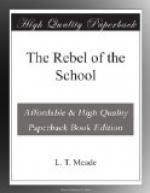But Ruth’s unhappy face certainly attracted attention. Cassandra Weldon noticed it first of all. In recess she went up to her and took her hand.
“Ruth,” she said, “you must come home with, me to dinner. Afterwards we can have a good chat; and then you shall have a room to yourself in order to work up your lessons for Miss Renshaw. But what is the matter, Ruth? You don’t look well.”
“I am quite well,” answered Ruth; “but I don’t think I’ll be able to come back with you to-day, Cassie.”
“Oh, what a pity, dear! Is your grandmother ill?”
“No; she’s quite well.”
“And your grandfather?”
“They are both quite well. It is—no, it’s not nothing, for it is something; but I can’t tell you. Please don’t ask me.”
“You look very sad.”
“I feel miserable.”
“I wonder—” said Cassandra thoughtfully.
Ruth looked at her. There was absolute despair in the eyes generally so clear and steadfast and bright. At this moment Kathleen O’Hara was seen passing through the playground in a sort of triumphal progress. She was accompanied by quite a tail of girls: one hung on her right arm, another on her left; a third danced in front of her; and other girls followed in a thick procession.
“I feel like a queen-bee that has just swarmed,” she remarked en passant to Cassandra Weldon.
Her rude words, the impertinent little toss of her head, and the defiant glance out of her very dark-blue eyes caused Cassandra to stamp her foot.
“Ruth,” she said, “I don’t like your friend Kathleen O’Hara.”
“But I love her,” said Ruth.
“That is just it. She makes you all love her and then she gets you into trouble.”
“But getting into trouble for a friend doesn’t make you hate that friend,” said Ruth.
“Well, I fail to understand her. I agree with Alice Tennant about her. A girl of that sort—fascinating, handsome, dangerous—works havoc in a school.”
“Listen, Cassie,” said Ruth suddenly. “A good many people will be saying bad things about Kathleen before long, and perhaps you will be questioned. I know that Alice Tennant has been questioned already. Will you promise me something, Cassie?”
“You look so imploring that I’d like to promise you anything; but what is it?”
“Do take her part when the time comes. You are certain to be asked.”
“But I don’t know her. How can I take her part?”
“You can say—oh, the kindest things. You can explain that she has always been bright and gay and loving and kind.”
“I don’t know that she has.”
“Cassie,” said Ruth, “your goodness to me has been almost past understanding; but I could hate you if you spoke against her, for I love her.”
Just then a teacher came out, touched Ruth Craven on her arm, and said:
“Will you go at once to see Miss Ravenscroft?”




